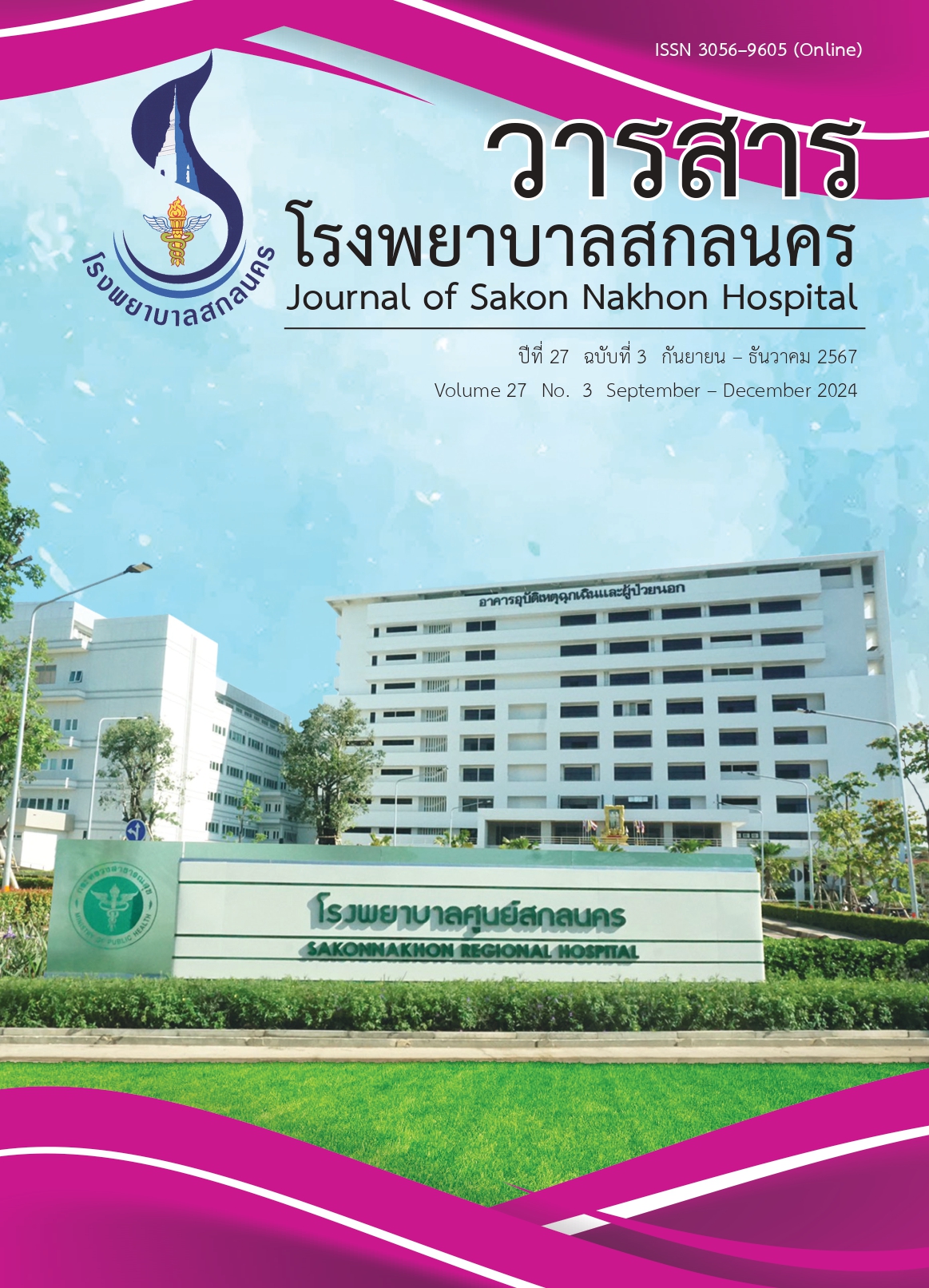A Survey Research: Happiness Levels and Coping Behaviors with Work-Related Problems among Personnel at Sisaket Rajabhat University
Keywords:
Happiness levels, Coping behaviors with work-related problems, HAPPINOMETER, Rajabhat university personnelAbstract
This survey research aimed to study the happiness levels, coping behaviors with work-related problems, and the relationships between demographic characteristics, happiness, and coping behaviors among personnel at Sisaket Rajabhat University from July 1st to September 30th, 2023. The sample consisted of 138 personnel selected through simple random sampling. The research instruments included the HAPPINOMETER assessment and a work-related coping behavior questionnaire. Data were analyzed using percentage, mean, Chi-square, and Fisher's exact test.
The research results revealed that the level of happiness at work was high at 56.5%. Dimensions 1-7, which include good health, relaxation, kindness, spirituality, family, society, and pursuit of knowledge, were all at high levels. Dimensions 8-9, covering financial health and work satisfaction, were at moderate levels. The overall average happiness level was high ( = 3.47, S.D. = 0.51). Regarding problem-focused coping behaviors at work, the top two practices at high levels were learning from past experiences for self-development and resolving situations based on experience. The overall implementation was at a moderate level (
= 1.88, S.D. = 0.57). For emotion-focused coping behaviors, the top two practices at high levels were increasing activities such as listening to music, playing sports, gardening, and getting more sleep. The overall implementation was at a moderate level (
= 1.55, S.D. = 0.52).
References
กนกอร เปรมเดชา. ความสัมพันธ์ระหว่างปัจจัยสภาพการทำงานการจัดการความเครียดและระดับความเครียดของพนักงานมหาวิทยาลัย [การค้นคว้าอิสระปริญญาบริหารธุรกิจมหาบัณฑิต]. ปทุมธานี: มหาวิทยาลัยเทคโนโลยีราชมงคลธัญบุรี; 2559.
กิติพัฒน์ ดามาพงษ์. ความสุข ความพึงพอใจต่อความผูกพันของบุคลากรที่มีต่อสำนักงานกองทุนสนับสนุนการสร้างเสริมสุขภาพ (สสส.) [การค้นคว้าอิสระปริญญารัฐศาสตรมหาบัณฑิต]. กรุงเทพฯ: มหาวิทยาลัยธรรมศาสตร์; 2559.
Carver CS. Coping. In: Gellman MD, Turner JR, editors. Encyclopedia of behavioral medicine. New York: Springer; 2013. P.496-500.
Goldman R. Healthy coping skills for uncomfortable emotions; emotion-focused and problem focused strategies. [Internet]. 2022 [ cited 2022 Oct 9]. Available from : https://www.verywellmind.com/forty-healthy-coping-skills-4586742
Weiers R M. Introduction to business statistics. Pennsylvania: Duxbury Press; 2005.
Lazarus RS, Folkman S. Stress, Appraisal, and Coping. New York: Springer; 1984.
กองนโยบายและแผน. ความสุขในการทำงานของบุคลากรมหาวิทยาลัยราชภัฏนครปฐม ปีงบประมาณ 2562 [อินเทอร์เน็ต]. [เข้าถึงเมื่อ 12 พฤศจิกายน 2566]. เข้าถึงได้จาก: https:// news.npru.ac.th/userfiles/S06A/nm_files/20191016163012_รายงานความสุุขในการทำงาน.pdf
กระทรวงสาธารณสุข, กรมสุขภาพจิต. คู่มือเปลี่ยนร้ายกลายเป็นดี: พลังสุขภาพจิต. พิมพ์ครั้งที่ 6. กรุงเทพฯ: บียอนด์พับลิสชิ่ง; 2563.
ฐิติวัจน์ ทองแก้ว, ประสพชัย พสุนนท์. ปัจจัยที่ส่งผลต่อความสุขในการทำงานของบุคลากรสายสนับสนุนวิชาการ มหาวิทยาลัยราชภัฏจันทรเกษม. ว. มหาวิทยาลัยศิลปากร มนุษยศาสตร์สังคมศาสตร์และศิลปะ 2560;10(1):1943-1958.
อังศนา อินแดน. ศึกษาแรงจูงใจที่มีผลต่อการปฏิบัติงานของบุคลากรสายสนับสนุนมหาวิทยาลัยราชภัฏนครสวรรค์. ว. มจร มนุษยศาสตร์ปริทรรศน 2565;8(1):255-272.
Greenfield C, Terry M. Work/life: From a set of programs to a strategic way of management. Employment Relations Today 1995:22(3):67-81.
พิมลพรรณ ดีเมฆ, ศิริพร เงินทอง. พฤติกรรมสุขภาพของบุคลากรมหาวิทยาลัยราชภัฏกำแพงเพชร. รายงานสืบเนื่องจากการประชุมวิชาการระดับชาติ ครั้งที่ 6 [อินเทอร์เน็ต]. [เข้าถึงเมื่อ 12 พฤศจิกายน 2566 ]. เข้าถึงได้จาก: https://research.kpru.ac.th/research2/pages/filere/9892020-01-10.pdf
Garland LM, Bush GT. Coping behaviors and nursing. Virginia: Reston; 1982.
Downloads
Published
How to Cite
Issue
Section
License
บทความที่ตีพิมพ์ถือว่าเป็นลิขสิทธิ์ของวารสารโรงพยาบาลสกลนคร การคัดลอกเพื่อพัฒนาเชิงวิชาการต้องได้รับการอ้างอิงอย่างถูกต้อง






